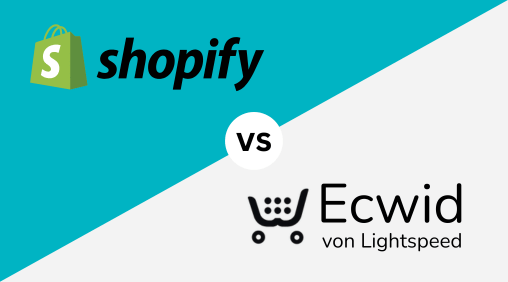Choosing the right e-commerce platform is equally crucial for founders, small businesses, and established brands. Two systems are particularly often compared: Ecwid vs Shopify. Both promise to make building a professional online store simple and efficient—but they take very different approaches.
Shopify is a complete, standalone platform that offers hosting, design, payment processing, and a massive app ecosystem. This makes it ideal for anyone who wants to build an online store from scratch or scale it long term.
Ecwid, on the other hand, is not a full-fledged shop system but a flexible add-on. It can be integrated directly into existing websites or social media channels, quickly turning an existing online presence into an online store.
This very difference makes the comparison so interesting. In this article, we take a detailed look at features, pricing, advantages, and disadvantages of both solutions and show which platform is best suited to which business model.
Shopify vs Ecwid comparison
The market for e-commerce solutions is growing rapidly. More and more merchants want to sell their products online—either through a standalone webshop or via social media channels. This inevitably raises the question: Which platform best fits your goals?
The cloud-based shop system is globally regarded as one of the best-known all-in-one solutions and is aimed primarily at beginners looking for a fully equipped system from a single source, including hosting, design, and integrated payment processing.
The shop add-on, by contrast, follows a different approach: it enhances existing websites or social media profiles with sales functionality, without the need to build a standalone platform.
This distinction is key: do you need a powerful all-in-one system with full functionality, or is it enough to extend your existing online presence with a lightweight sales option? This core question forms the basis for the detailed comparison of both models.

Chapter 1: Shopify System
Since its founding in 2006, the cloud-based shop system has become one of the world’s leading e-commerce platforms. It is particularly popular with beginners and growing brands, as it combines hosting, shop design, payment processing, marketing tools, and a massive app marketplace in an “all-in-one” solution.
A Shopify store can be set up in just a few hours—even without technical knowledge. At the same time, the system is highly scalable thanks to custom development and Shopify Plus Apps.
As a result, the cloud-based shop system is suitable for small start-ups, mid-sized retailers, and international brands alike, especially those that value flexibility, security, and future readiness.
Key Features:
- Over 100 professional themes
- Integrated payment processing (Payments, PayPal, Klarna, etc.)
- Product management with variants, inventory, and digital products
- SEO tools, blog functionality, marketing integrations
- App Store with over 8,000 extensions
- Multilingual support & multi-currency
- Integration with marketplaces (Amazon, eBay) and social media (Instagram, TikTok, Facebook)
|
Advantages |
Disadvantages |
|
Very beginner-friendly and quick setup |
Monthly fixed costs from €27 |
|
Professional design & large app ecosystem |
Transaction fees without Shopify Payments |
|
Strong scalability up to the enterprise level |
Customizations often require programming skills |
|
Comprehensive marketing & SEO features |
Additional costs for premium themes and apps |
According to numerous reviews, the platform is ideal for anyone who wants to quickly build a professional online store without worrying about technical details. At the same time, Shopify Advanced and Shopify Plus provide a powerful foundation for more complex requirements.

Chapter 2: Ecwid System
Founded in 2009, this add-on follows a very different approach from Shopify. It is not a complete e-commerce platform but an “add-on solution.”
This shop extension allows a store to be easily embedded into an existing website—such as WordPress, Wix, Squarespace, or a custom HTML site. Direct integration into social media platforms like Facebook, Instagram, or TikTok is also possible.
Ecwid is therefore primarily aimed at small businesses, freelancers, or self-employed individuals who already have a website and are simply looking for an easy way to sell products online.
Its biggest advantage: it is cloud-based, requiring no separate hosting or manual maintenance. It is particularly interesting for merchants pursuing omnichannel commerce—selling simultaneously via website, social media, and marketplaces.
Since all channels are managed centrally in one dashboard, shop owners always have full visibility over products, orders, and customers.
Key Features:
- Fast integration into existing websites (via plugin or embed code)
- Sales via social media and marketplaces
- Centralized management of multiple sales channels
- Responsive, mobile-optimized design
- Multilingual support
- From the “Business” plan: automated taxes, product variants, SEO tools
- Cloud-based, no updates or server costs
|
Advantages |
Disadvantages |
|
Very easy integration into existing websites |
Less customizable than Shopify |
|
Free basic plan for up to 5 products |
Limited design options |
|
Affordable entry-level prices |
Dependence on the existing website structure |
|
Ideal for social selling and small shops |
Quickly too small for growing shops |
Reviews consistently show that this add-on is an attractive, cost-effective solution for small merchants or solo entrepreneurs who want to integrate products into an existing web presence. However, anyone needing a standalone, professionally scalable shop system will quickly hit its limits—where the cloud-based shop system clearly excels.
Chapter 3: Feature comparison
Choosing the right e-commerce platform is critical. Both systems enable professional online shops but differ fundamentally: the cloud-based system is a standalone all-in-one solution, while the add-on extends existing websites or social media channels.
Comparison in detail:
|
category |
Shopify |
Ecwid |
|
Setup & Usability |
Complete shop system, ready to go, intuitive setup with dashboard and templates. |
Integration into existing website; quickly implemented, depending on the platform (e.g., WordPress, Wix). |
|
Design & Templates |
Over 100 mobile-optimized themes, fully customizable; larger customizations require HTML/CSS. |
Automatically adapts to existing design; consistent, but less freedom. |
|
Product management |
Extensive: variants, digital products, inventory, automation. |
Solid, but very limited in the free plan (max. 5 products); more features only available in higher plans. |
|
Payment processing & fees |
Shopify Payments integrated; additional >100 gateways; fees for non-use. |
No commission; only fees from payment providers (e.g., PayPal, Stripe). |
|
Shipping options |
Shipping zones, discounts, real-time calculation, integration with logistics providers. |
Standard features, real-time pricing only in higher plans. |
|
Marketing & SEO |
Blog, discount codes, vouchers, abandoned cart emails, SEO via metadata and URLs. |
Basic SEO functions; advanced features only in higher plans. |
|
Apps & Integrations |
App Store with >8,000 extensions (ERP, newsletter, social media). |
Smaller marketplace, focus on standard integrations. |
|
Scalability & Performance |
Scalable: from entry-level plans to the Plus version; high stability and performance. |
Good for small to medium-sized shops; lacks features for large brands. |
The comparison shows that both systems have their strengths but serve different needs.
- The add-on is ideal for small shops and self-employed individuals with an existing website who want to start selling products online quickly.
- The cloud-based shop system, on the other hand, offers a complete and scalable e-commerce solution, suitable for everyone from beginners to international enterprises.
Those who want to fully leverage the cloud-based shop system—from custom coding and conversion optimization to advanced integrations—will find the right partner at datora.de.
Conclusion: The add-on is sufficient for a quick start, but for sustainable growth in e-commerce, there is no way around the cloud-based shop system.

Chapter 4: Pricing - Which Plan Is Worth It?
Pricing is often a decisive factor when choosing an e-commerce platform. A direct pricing comparison clearly shows that both providers target different audiences: the cloud-based system relies on clearly tiered plans for growing businesses, while the add-on lowers the barrier to entry with a free plan.
For many founders, cost is a crucial consideration. The comparison reveals clear differences between the two models:
|
Shopify |
Ecwid |
|
Basic: from 27 €/month |
Free: 0 €/month (up to 5 products) |
|
Shopify: from €79/month |
Venture: approx. 19 €/month |
|
Advanced: from 289 €/month |
Business: approx. €39/month |
|
Plus: from €2,000/month |
Unlimited: approx. 99 €/month |
|
Additional costs: Transaction fees (0.5-2%), premium themes, apps |
Special feature: no own sales commissions; only payment providers (e.g. PayPal, Stripe) charge fees |
Price vs Value
- Beginners: the add-on stands out with its free plan, ideal for testing.
- Growth: the cloud-based shop system offers greater professionalism, automation, and marketing power starting from the mid-tier plans.
- Enterprise: with Shopify Plus, you get a true enterprise solution including APIs and dedicated features.
In summary, those who want to start small can do so affordably and easily with the add-on. As soon as scalability, automation, and professional marketing features become important, the cloud-based shop system is the better choice—especially with advanced plans like Shopify Plus for enterprises.
Chapter 5: Which Platform Is Right for Whom?
The comparison makes one thing clear: both systems are justified, but they cater to different target groups.
- Small Businesses & Beginners: For founders or self-employed individuals with an existing website, the add-on is particularly attractive. The free basic plan allows the sale of up to five products—perfect for getting started. Those without an existing web presence who want to launch a complete online store right away are better served by the cloud-based shop system, as it provides everything from a single source.
- Mid-Sized Businesses: Growing small shops may still use the add-on for a time, but as product counts increase or international requirements arise, limitations quickly appear. The cloud-based shop system offers far more possibilities in this area: automations, apps, and integrations make it the ideal solution for building and professionally scaling an e-commerce store.
- International Scaling: For international expansion, the cloud-based shop system clearly has the advantage. Features such as multilingual support, multi-currency, and a wide range of international payment providers make global commerce straightforward. Shopify Plus additionally offers a true enterprise-grade solution. While the add-on can technically support international sales, it remains much more limited in comparison.
- Specialized Industries: For smaller niche use cases, the add-on is a practical tool: a café, association, or service provider can quickly add sales functionality to an existing website. More ambitious projects—such as food brands with delivery services or international coaching businesses—benefit significantly from Shopify’s flexibility and performance.
Practical Example: A yoga coach with a WordPress website can easily integrate courses and products using the add-on. A fashion brand aiming for international growth is far better positioned with the cloud-based shop system—where a broader shop comparison with alternatives like Magento or WooCommerce may also be worthwhile.
The add-on is an ideal solution for very small shops and solo entrepreneurs with an existing website. The cloud-based shop system, by contrast, is the sustainable choice for anyone looking to grow, sell internationally, or rely on a professional shop system with a long-term perspective.

Chapter 6: Pros and Cons
After analyzing features, pricing, and target audiences, it is worth taking a closer look at the pros and cons. The following overview highlights the key strengths and weaknesses of both platforms at a glance.
|
category |
Shopify |
Ecwid |
|
Advantages |
- Very beginner-friendly, quick start - Professional design & huge app store - Comprehensive marketing & SEO features - Scalable up to the Plus version |
- Free entry (up to 5 products) - Easy integration into existing websites - Ideal for small shops & social selling - Low cost, cloud-based, maintenance-free |
|
Disadvantages |
- Monthly fixed costs from 27 € - Transaction fees without Shopify Payments - Adjustments often require programming - Additional costs for themes & apps |
- Less flexible than Shopify - Limited design options - Dependence on existing website structure - Quickly too small for growing shops |
The comparison clearly shows:
- Add-on: stands out with easy integration, a free entry plan, and solid core features—an attractive solution for small shops or beginners with an existing website.
- Cloud shop system: excels in scalability, a huge app ecosystem, and professional marketing tools. Anyone looking to grow, increase revenue, or expand internationally will find this to be the significantly stronger platform.
In short, both systems have their strengths but serve very different needs. The add-on works well as a practical tool for an uncomplicated start, while the cloud-based shop system provides the long-term foundation for professional growth.
This naturally leads to the next question: what other alternatives are available on the market, and how do they compare?
Chapter 7: Alternatives & Competitive Comparison
Both Shopify and Ecwid are strong systems, but they are not the only options available. Especially in e-commerce, there are numerous other providers that may be interesting alternatives depending on the business model. Anyone aiming to make the right choice should also consider competitors such as WooCommerce, Shopware, or Magento.
Other competitors:
- German solution, popular with medium and large retailers
- Very flexible, but more complex to use
- Good for individual requirements
- Higher technical effort than Shopify
- Wix vs Shopify
- Website builder with integrated shop function
- Easy entry for very small retailers
- Less scalable for growing companies
- More suitable for simple shops
- Magento vs Shopify
- Enterprise solution with enormous flexibility
- Almost unlimited customization options
- Very complex to set up and maintain
- Many companies switch to the cloud shop system because of its ease of use
- Shopify vs WordPress
- Classic alternative: the cloud shop system or WordPress + WooCommerce
- Cloud shop system = complete solution without maintenance effort
- WordPress = maximum freedom, but more maintenance
- Decision depends on individual priorities
- Shopify vs Etsy
- Etsy:
- Marketplace for handmade & creative items
- full brand sovereignty and independence
- offers instant reach
- Other alternatives
- PrestaShop for flexible open-source shops
- Squarespace with a focus on design
- BigCommerce for medium and large shops
- Scayle vs Shopify Plus in the enterprise segment
A look at the alternatives shows that each platform has its strengths—from Wix for beginners to Magento for enterprise use. Ultimately, the deciding factor is which solution best fits your business model. For small shops, the add-on is a solid choice; for growing brands and international businesses, however, the cloud-based shop system remains the strongest and most sustainable option.
Chapter 8: Real success stories
Theory highlights the differences between the add-on and the cloud-based shop system, but real-world success stories are even more convincing. Many well-known brands rely on the cloud-based shop system and place their trust in our expertise. Together with our clients, we have been able to leverage the platform to its full potential and take their online stores to the next level.
Three examples:
- More Nutrition : is a German supplement company and a brand of Quality First GmbH, headquartered in Elmshorn. Its mission is to enable restriction-free diets through innovative products.
Our role: We optimized the shopping experience, developed custom features, and supported the migration to Shopify 2.0. In addition, we manage and coordinate product launches and campaigns, ensuring the store remains flexible and future-proof. - ESN (Elite Sports Nutrition): is a leading German sports nutrition brand and part of Fitmart GmbH & Co. KG. The company focuses on supplements for strength and performance athletes.
Our role: In close collaboration with the internal IT team, we improved the shopping experience, expanded functionality, and successfully implemented the migration to Shopify 2.0. This laid the foundation for higher performance, an improved customer journey, and further expansion. - OACE : is a German sportswear company based in Heilbronn. Its product range includes leggings, shirts, hoodies, and jackets, with a strong focus on performance and streetwear.
Our role: We optimized the shopping experience, developed custom features, and handled the coordination of product launches and campaigns. As a result of the Shopify implementation, the store is now ideally positioned for growth and new collections.
These real-world examples clearly demonstrate that the cloud-based shop system is the optimal choice for brands looking to grow, differentiate themselves, and scale their business. With an experienced partner like datora.de, even complex requirements can be transformed into tailored solutions—from custom functionality to long-term conversion optimization.









